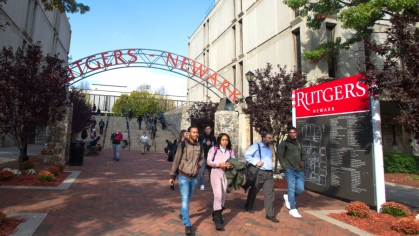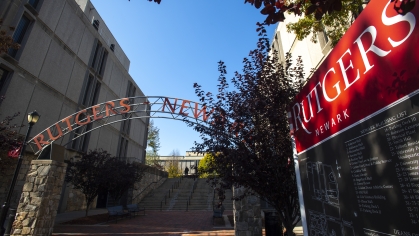Graduate Inspired at RU-N to Tell Community Stories Through Journalism
At Rutgers-Newark, graduate Solcyre Burga discovered a passion for journalism that led her to explore conditions in her neighborhood middle school that she never questioned as a child.
“There was a whole year we didn’t have a social studies teacher. We didn’t have math textbooks,’’ she recalled. “But I don’t ever remember watching the news and people talking about that. I wanted to fill in the gaps.’’
Today, Burga, who grew up in Newark’s Ironbound section, is working as a fact checker and reporter at TIME magazine. She credits her professors in the Department of Arts, Culture and Media –and RU-N’s dedication to social justice within the city of Newark and beyond –with spurring her to find her calling.
The daughter of Peruvian immigrants, Burga was enrolled in the Rutgers Future Scholar program from seventh grade through high school, attending classes on the weekends. There were tutoring sessions and courses in film and physics. “Those things weren’t necessarily taught in our school,’’ she said.
RU-N’s undergraduate mentors guided Burga, a first-generation college student, through the application process and prepared her for university life. “If it wasn’t for Future Scholars, we would have had to do it all on our own,’’ she said. ”It was very much a support system that I relied on and knew I could count on.”
Burga chose to attend RU-N, not only for its rigorous academic programs, but for its commitment to Newark and its residents. “The motto, ‘we’re not just in Newark but of Newark’ is true,’’ she said.” There are so many students from the city. I grew up in the Ironbound, where people speak Portuguese and Spanish. But at Rutgers-Newark, I was lucky enough to talk to people from other parts of the city. I was able to remain in the community that I was used to and be exposed to new people, too.’’
Although she initially wanted to pursue public policy, Burga took a class in journalism and switched gears with the encouragement of a professor who inspired her to cultivate her talent for writing and reporting. Her professors also emphasized drawing from personal experience to uncover stories that weren’t being told.“
They said it’s important that we are the ones to tell that story,’’ she said. “I don’t remember media attention being given to education in Newark and how underfunded it was, about the asbestos problem at Wilson Avenue School. This is what pushed me into journalism.


